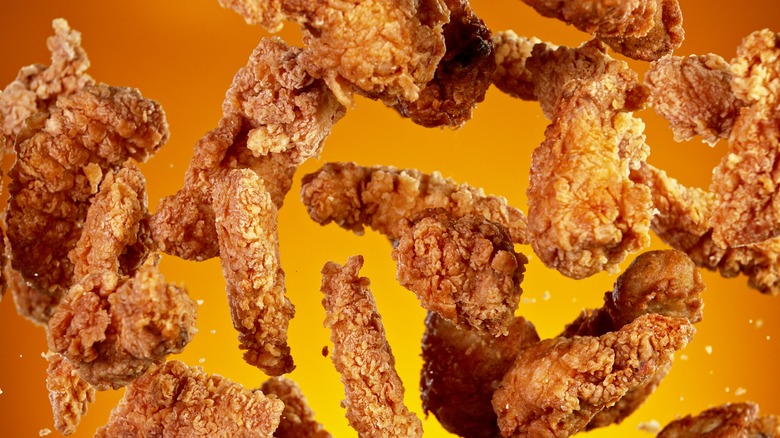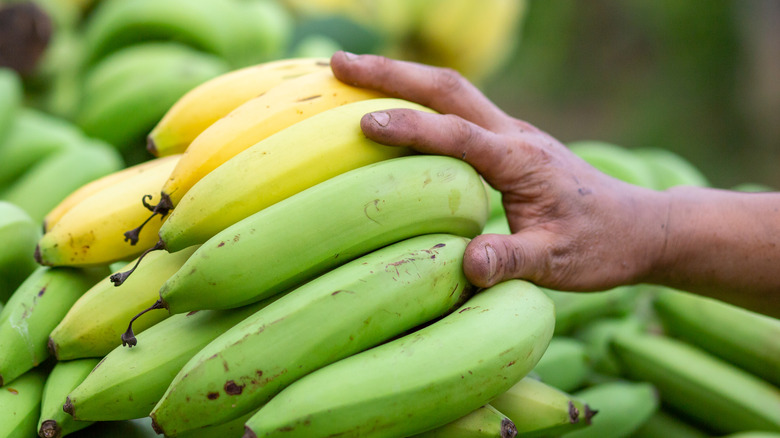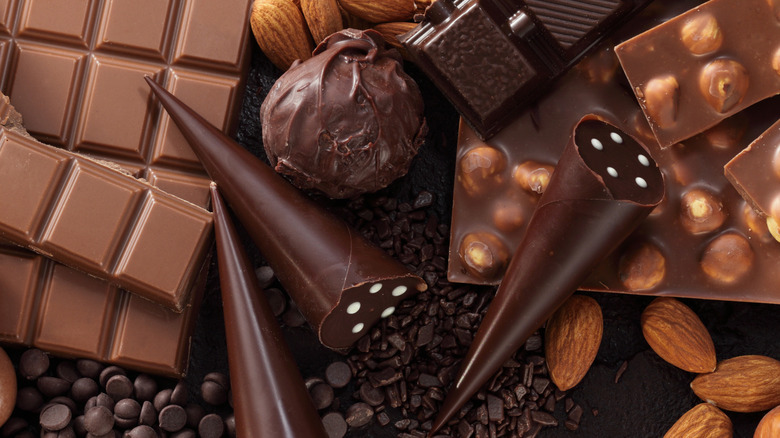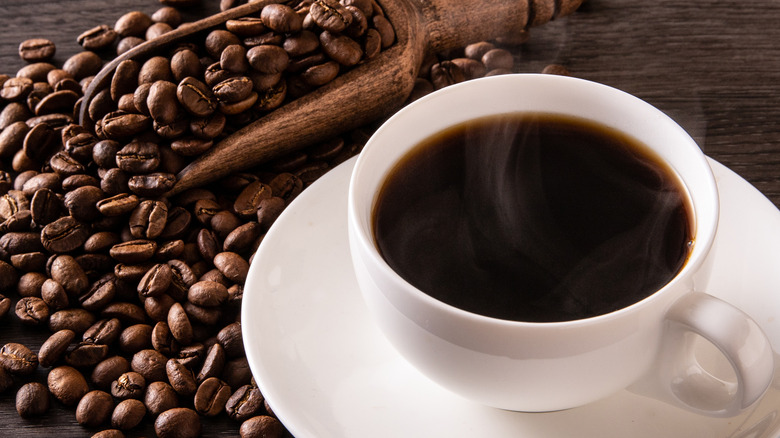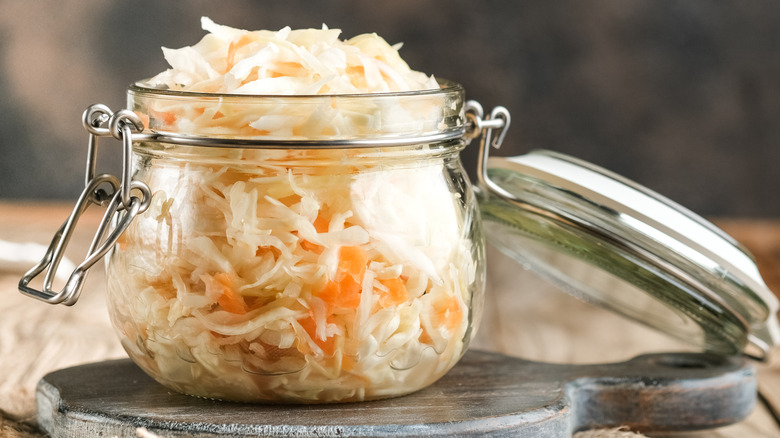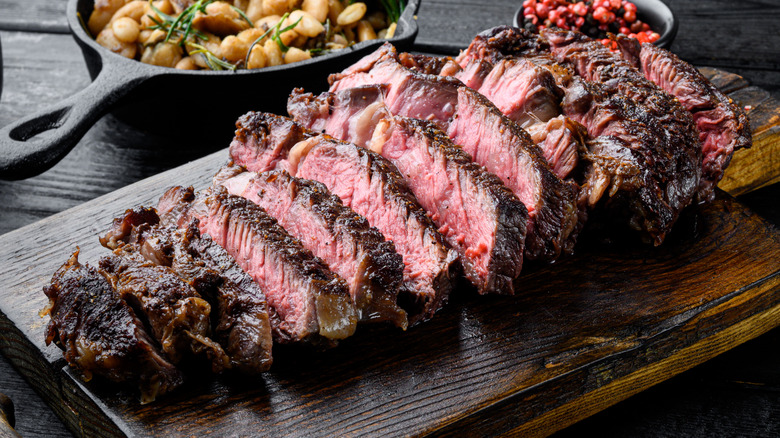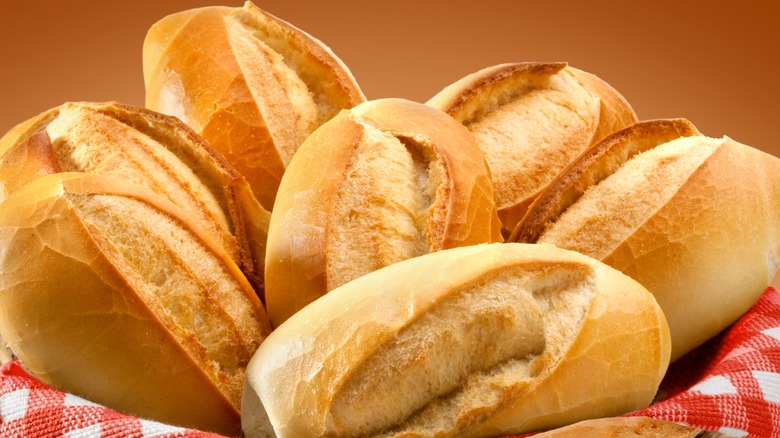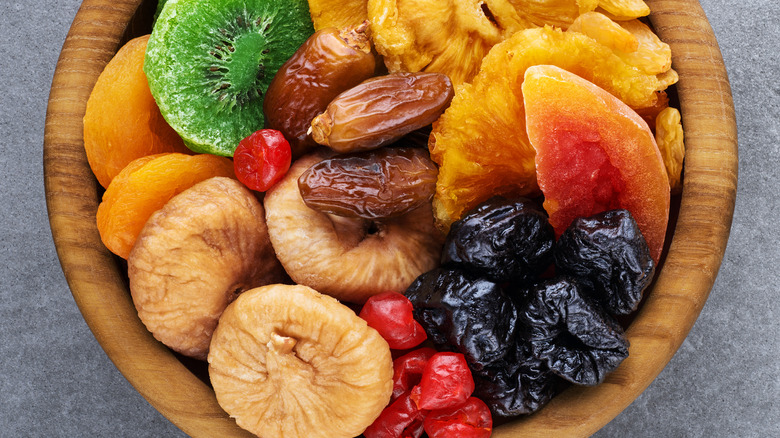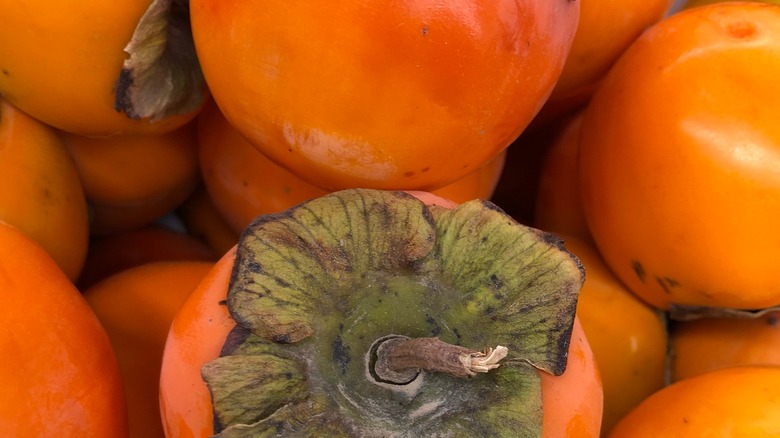14 Foods That Can Cause Constipation
Of all the conditions that can affect your digestive system, few are as uncomfortable, or as common, as constipation. Characterized by discomfort and difficulty passing stools regularly, constipation is something that millions of Americans experience every year, and with 2.5 million doctors' appointments booked annually by folks who need help relieving constipation (per John Hopkins Medicine), it's fair to say we could stand to learn more about how to tackle it.
The problem lies in the fact that constipation can be caused (or contributed to) by a huge number of things, including the medication you're taking, traveling, age, dehydration, or simply not listening to your body acutely enough when you need to go poop. Naturally, what you're eating is also a huge factor in how easily things are coming out the other end. Our diets can massively affect the quality of our stools, and while eating adequate amounts of fiber is a great way to ensure consistent bowel movements, there are also a large number of foods that can inhibit proper digestive activity and make constipation worse.
In our pursuit to help the nation's bowels (look, someone has to do it), we've decided to put together a list of the worst foods out there for constipation. Join us as we take a look.
Fried chicken
So there's little denying it: For a lot of folks, fried chicken is as delicious as it gets. But unfortunately, your bowels may not think so, and fried chicken is not going to do you any favors on the constipation front. As fried chicken is normally cooked using copious amounts of oil, it tends to have high levels of saturated fats. Consuming large amounts of saturated fats regularly has been found to notably increase the prevalence of constipation, as research published in Neurogastroenterology & Motility shows.
This, of course, doesn't just mean that eating lots of fried chicken could impact your bowels: It means that eating lots of any fried food could. Given that high saturated fat intake in the diet can also have a huge impact on your cholesterol levels and heart health (per MedlinePlus), making sure that you keep an eye on your intake is crucial. If possible, swap out fatty food options for choices that are cooked via different methods (you might want to try air-fried chicken or baked chicken as a substitute for fried chicken, for example), check the labels of foods that you're buying, and try and prioritize consuming unsaturated fats that are healthier for your heart, advises Heart UK.
Frozen meals
You've had a long day, you've got in from work late, and the thought of cooking something from scratch is just a little too much right now. In such situations, what's more convenient than just heating a frozen TV dinner? But while TV dinners and other prepared meals might be a quick option to cook and eat, things get slightly less quick and easy on the other side. Prepared food options can often be lacking in fiber, an essential component in ensuring regular bowel movements (per the National Institute on Aging). Eating these meals regularly can contribute to an overall fiber deficiency, as well as greater difficulty passing stools.
Constipation as a result of too many prepared meal options may be more likely to affect those who live alone, older adults, or (logically) people who find it difficult to cook meals themselves. If this is the case, it might be worth considering how you can introduce fiber sources into your diet that aren't particularly labor-intensive. Consuming snacks like fresh vegetables and fruit or taking a psyllium fiber supplement may allow you to keep on top of your fiber consumption needs.
Make sure that you're drinking plenty of water, too — in addition to being low on fiber, some of these pre-prepared meals may be high in sodium, contributing to dehydration (which may exacerbate constipation symptoms).
Bananas
So before we continue, let's address the elephant in the room. Bananas are healthy, right? And healthy things don't cause constipation, right? And given that bananas are a good source of fiber (with the average banana having 3 to 4 grams of fiber, per WebMD), surely that means that they're good for your bowels ... right?
Well, the truth of the matter is slightly more complicated. When they're ripe, bananas can be useful to move stools through the bowel thanks to their high soluble fiber level, says registered dietitian and certified personal trainer Tammy Lakatos to Everyday Health. But "unripened, green bananas are constipating," Lakatos warns. This is down to their high resistant starch levels, which might limit bowel movements, and which are reduced as they ripen, states Mind Body Green.
Bananas, along with rice, applesauce, and toast, are a component of the BRAT diet, a group of foods specifically clumped together because of their binding effects on stools (via Livestrong). This might have a useful function when you're experiencing diarrhea and need more bulk to your poop — but if you're already undergoing constipation, it's worth considering whether eating bananas may help or hinder this.
Chocolate
It's hard to find people who hate chocolate. But knowing the effect that chocolate might have on your bowels and your experience of constipation might cause you to think twice about buying that extra bar.
Part of what makes chocolate so darn delicious is its high fat content, but consuming this very same fat can also result in us digesting food more slowly, says MedicineNet. When this happens, peristalsis occurs, a slowing-down of muscle contractions in the bowel, meaning that your poop takes longer to move through your system, potentially contributing to constipation.
It's also worth bearing in mind that some chocolates have levels of caffeine, which may also cause bowel issues. Caffeine has a dehydrating effect, and this might make your stools harder, drier, and more difficult to pass. If you're keen to keep chocolate on the menu, though — and frankly, why wouldn't you be? — it may be a good idea to favor buying dark chocolate. More than its milky counterpart, dark chocolate can have a good level of fiber per serving, with around three grams for a 70-85% cacao solid blend, says WebMD.
Coffee
Ah, coffee. How we love thee. How we need thee. And how disappointed we were to find out that you may not be the best thing for our bowels.
This might come as a surprise to some people, given that in many cases, coffee can be the thing that gets our bowels moving in the morning. "It increases gut motility, which means that it accelerates contractions that help move contents of the gastrointestinal tract forward and out of the body," says "Smoothies & Juices: Prevention Healing Kitchen: 100+ Delicious Recipes for Optimal Wellness" author and registered dietitian nutritionist Frances Largeman-Roth to Livestrong. But in other cases, coffee may be the cause of that constipated feeling.
Thanks to its diuretic effect from caffeine, coffee can dehydrate you. When your body becomes dehydrated, it compensates by trying to draw additional water from your stools, and this might cause constipation or make it worse. And if you're not drinking your coffee black, the additions you're making to your cup may also worsen things. "While a couple of tablespoons of milk are very unlikely to cause an issue, if you're drinking from a very large tumbler, and half of it is filled with milk, this could be a problem. The same is true if you're adding several sugars to your coffee," says Largeman-Roth.
Milk
Milk has been a staple in the diet since time immemorial, due to its availability and nourishing qualities. But one part of the body that might not like milk so much is your bowels.
While it may not be the case for all people, cow's milk can have a constipating effect on some individuals, according to the Cleveland Clinic. This can be particularly common in toddlers and children, and may reveal a possible intolerance to cow's milk and the proteins present in it, as research published in The New England Journal of Medicine indicates.
As such, if you're finding that constipation is occurring when you or your loved ones are drinking regular cow's milk, it might be worth considering a switch. Moving to plant-based milk, like oat milk, could be a good idea. As an alternative to cow's milk, oat milk generally has a slightly higher fiber level than other milk, with around 2-3 grams of fiber per serving, says the Cleveland Clinic. This fiber may contribute to healthier bowel movements.
Sauerkraut
As a fermented food, sauerkraut is almost universally praised. Abundant in nutritional qualities, eating the cabbage condiment regularly may bolster your immune system, assist in supporting brain health, and may even reduce your risk of developing certain cancers thanks to its antioxidant and probiotic qualities, says Healthline. But if these nourishing qualities are causing you to run to the sauerkraut aisle for the first time, it's best to be warned about its effects on your bowels — temporarily, anyway.
While the healthy bacteria from the sauerkraut will ultimately benefit your digestion over time, "in the short-term, introducing large amounts of probiotic bacteria can lead to rapid changes in your gut flora that cause constipation," according to nutritionist Lisa Richards (via Bustle). For this reason, it's best to introduce sauerkraut to your diet slowly, seeing how it impacts your digestive system and bowels, and then increase the amount you're eating over time. Pretty soon, you'll be feeling the full benefits of this fermented favorite.
Red meat
Red meat doesn't exactly have the best rep when it comes to health, with eating higher quantities of red meat linked to poorer heart health and potentially higher rates of certain cancers (per Medical News Today). And unfortunately, when it comes to your bowels, red meat may not fare much better. Eating red meat can contribute to constipation in a few ways. Firstly, red meat is protein-rich and fiber-poor, and eating significant amounts of it may reduce your overall fiber intake, especially if you're choosing it in favor of other fiber-rich options (via Healthline). The less fiber you get, the more likely you are to experience a backed-up feeling.
There's also the small case of red meat's average fat content. Whereas other sources of protein may be leaner, cuts of red meat usually have more fat and saturated fat per serving. These fats can slow the digestion process right down, and when this happens, constipation is more likely to occur. For people who are concerned about constipation while also getting good levels of protein, it might be prudent to consider protein sources that also have high fiber levels, like beans or pulses.
White bread
White bread is cheap, easy to find, versatile, and undeniably pretty tasty. But despite these positives, it's far from the best thing for your body — and your bowels, in particular. This is because white bread, unlike bread and carbohydrates that consist of whole grains, usually undergoes a large amount of processing. "Research shows that more processed grains like white bread and white pasta tend to be more constipating than whole grains," says Snap Kitchen's lead registered dietitian Sam Presicci to Cooking Light. "Since the bran and germ are removed from these simple carbohydrates, they lack the fiber that helps lower risk of constipation."
Switching to higher-fiber bread options (and higher-fiber carbohydrate options overall) can allow you to boost your fiber intake, and may ease constipation. Be warned, though, if you're switching immediately from all-processed choices to high-fiber loaves. If your body isn't accustomed to eating lots of fiber, you might find that suddenly introducing it might also initiate constipation, says Presicci. That's why you should "pay attention to how you feel and ramp up fiber consumption accordingly," she states.
Wine
There are few things in life more appealing than a glass of wine at the end of a long week. But if you're concerned about your movements and the potential for constipation, drinking wine regularly may not put your mind (or your bowel) at rest.
The main reason for this is the dehydration that occurs when you drink, says WebMD. The alcohol in wine inhibits the release of the hormone vasopressin, which works to keep water in your body and stop it from being released too quickly in urine. This, in turn, causes you to pee more frequently than usual and makes you dehydrated. And when this happens, your body compensates by drawing water from all available sources, including your poop while it's in your bowels, making it harder to pass smoothly and regularly.
Interestingly, the opposite can happen when you drink wine, too. Drinking larger amounts of alcohol may increase motility in your bowel and colon, prompting a flushing effect through your intestines and resulting in diarrhea. A solution to both constipation and diarrhea that may be potentially caused by drinking wine is to keep an eye on your intake and drink sparingly.
Dried fruit
On the surface of things, dried fruit is a pretty great snack. Rich in antioxidants, vitamins, and minerals, these little nibbles of sweetness are also super tasty, and a healthier alternative to other sugary treats (while also being high in sugar themselves, says BBC Good Food). Given that they're also high in fiber, it could be surprising that they're not great for constipation. But in certain cases, opting for dried fruit over fresh fruit could set your bowels back a little.
"The fact that they're dehydrated means they require a lot of water to be reconstituted and then digested," says functional diagnostic nutrition practitioner Justine Altman to Bustle. "So if you're not extremely well-hydrated, those dried fruits aren't digested well, leading to dense stool that's difficult to eliminate and causes a backup."
The solution? Make sure you're keeping on top of your hydration. Keep in mind that we may need substantially more fluids than we're getting, with 3.7 liters per day for men and 2.7 liters per day for women being good benchmarks to aim for (per the Mayo Clinic). Fresh fruit will also have a much higher amount of water in it than dried fruit and can contribute to hydration, so make sure that you're switching it up between the two.
Pastries
A flaky, buttery, indulgent pastry is one of life's greatest pleasures. Croissants, pain au chocolat, cinnamon rolls ... Excuse us while we get a napkin to mop up that drool. But let's be real, pastries aren't exactly healthy options, and one notable area where they might not be your body's best friend is in your bowels.
While their comparatively low fiber levels will do you no favors with constipation, pastries may also be especially troublesome due to their gluten content, says MedicineNet. The protein that gives wheat products their distinctive chewiness, gluten may be fine for most people to eat safely, but for individuals with gluten sensitivity, consuming it may trigger constipation. More specifically, those who have celiac disease should avoid gluten entirely, as it can cause not just constipation, but a host of other unpleasant symptoms as well, like diarrhea, fatigue, or even depression (per Healthline).
If you suspect that gluten is the cause of your hard-to-pass poops, it may be beneficial to switch to gluten-free options temporarily to see if there's a change, or to consult with your doctor about your options.
Persimmons
We've gotta be honest, we were pretty surprised at this one, too. After all, on the surface of things, persimmons seem like a wholly innocuous fruit that shouldn't really cause any problems, right?
Well, if you have concerns about constipation, you might want to steer clear of them, especially if you're not sure they're ripe enough. "Unripe or partially ripe persimmons may cause constipation, since they contain high amounts of tannins," says registered dietitian Sam Presicci to Cooking Light. These tannins (also found in wine and tea, as well as unripe bananas) can make things a little clogged up down there, reducing the speed of food passing through your intestines.
Thankfully, if your persimmons are ripe and ready to eat, they shouldn't cause any constipation problems. More importantly, they're going to be much nicer-tasting. If you're particularly worried about consuming persimmons, though, you might find that replacing them with plums or applesauce in recipes will give you a similar flavor.
Candy
A handful of candy is a surefire way to brighten anyone's day. Unfortunately, you may not be feeling so bright the next day.
Candy, as well as many other sweet treats out there, have a less-than-ideal combination of being composed of lots of sugar and little fiber, thanks to their high levels of processing. This sugar may have a constipating effect, and the lack of fiber means that your stool isn't getting the necessary bulk to pass through your system smoothly, according to Livestrong.
Naturally, we realize that most people's diets aren't composed entirely of candy (much to the disappointment of kids everywhere), so you may well be getting fiber from elsewhere. But if you're eating a lot of the sweet stuff, it's worth considering exactly where your dietary fiber is coming from, and how you can make choices that are both tasty and wholesome. Try substituting your regular candy fix for some fresh fruit: A serving of raspberries, for example, will not only give you a sweet treat, but will also provide 8 grams of fiber (which we're sure your bowel will thank you for).


